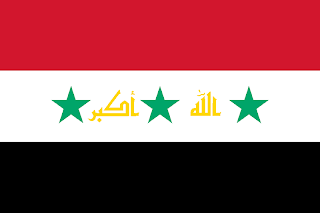The National Flag of Iraq
The original flag of Iraq adopted in 1921 used the colours of the pan-Arab Revolt, white, green, black, and red. The first flag consisted of a horizontal tricolour of black, white, and green. On the hoist side, is a red trapezoid. In the trapezoid are 2 white seven point stars. These stars represent the 2 peoples that make up Iraq, the Kurds and Arabs. This was the flag in use by the King of Iraq once Iraq finally regained its independence from Britain in 1932.
In 1958, King Faisal II of Iraq, and his cousin, King Hussein of Jordan moved to form the Arab Federation. It adopted a new flag. Keeping the pan-Arab colours, the red trapezoid was replaced with a simple red triangle.
The Federation lasted only 6 months, when King Faisal II was deposed by the military in a coup attempt. The coup brought Abdul Karim Qassim to power in Iraq, and in 1959, he brought in a new flag. This one, a vertical tricolour. The three stripes where black, white and green, the pan-Arabic colours. In the centre, a red star overlaid with a yellow sun. The yellow represents the Kurds, and the star represents the Assyrian minorities.
Another coup in 1963 saw Colonel Abdul Salam Arif come to power, and he brought in another flag. This one switched back to a horizontal tricolour, this time, of red, white and black. The three green stars where to stand for the 3 members of the United Arab Republic. A union of Syria, Iraq, and Egypt. A union that never happened.
Soon after, the Ba'ath Party came to power, and they decreed that the 3 stars stood for the 3 beliefs of the Party. Unity, Freedom, and Socialism.
In 1991, Saddam Hussein instituted another change. This time, in his own handwriting, placing "Allahu Akhbar" in between the stars. This was seen as a move to encourage the Islamic world to see him in a more favourable light, and encourage Islamic fighters to come to his aid during the first Gulf War in 1991.
After the second Gulf war ended, the new Iraqi authority removed Saddam Hussein's handwriting from the flag, and replaced it with the same text, but this time in the more ancient Kufic script. This flag came in in 2004.
In 2008, in readiness for a new flag to be adopted, the 3 stars where removed the flag, leaving the Takbir on its own in the white band on the flag.
The winning design was due to be unveiled in 2008. The new flag scrapped the use of the pan-Arab colours, and replaced it with white, blue and yellow. 3 stripes along the bottom where split blue/yellow/blue. The blue stood for the Tigris and Euphrates rivers, and the yellow represents the Kurdish minority. The top of the flag was white, with a large crescent in another shade of blue. The shade chosen was supposed to represent the Turkmen people.
This flag was not picked, due to huge opposition. Many lamented the loss of the pan-Arab colours, whilst others wanted the return of the Takbir. The flag was never formally adopted.
In 2008, more limited proposals where released. With the dropping of the Ba'ath party stars, one idea had a single star placed in the centre of the flag. The 8 point star was to surround a yellow sun. The Takbir split round it.
Another proposal did not scrap the stars, but changed the Takbir to yellow, to represent the Kurds.
So far, no change has actually been enacted.










.jpg)
the only flag that stands out its the one from 1963 for it being horizontal and having introduced the sun star that can be historical attributed to ishtar of babylon and the kurds
ReplyDelete